(A contribution to Broken Projector’s Double Bill-a-thon. The introduction stated that “the best of the cinema blogs in the blogosphere will churn out articles on back-to-back cinematic masterpieces,” but I decided to participate, too.)
One Night Only! Witness the Freaks!
More than a half-century separates these two movies, and they obviously live in different parts of town. Tod Browning’s horror classic Freaks was controversial upon its release in 1932 and hasn’t lost much shock value, with its use of real sideshow performers and the uncomfortable mixture of exploitation and sympathy. Peter Weir’s Witness is a mild drama about the Amish that masquerades as a cop thriller. (Or is it a cop thriller disguised as an Amish drama?)
Yet the two have much in common:
- The core narrative is about an outsider (the audience surrogate – the normal) entering an exotic, insular, isolated community.
- The community remains a curiosity to the outside world, an object of both fascination and derision.
- In both movies, the audience is asked to see this community as noble and pure, particularly in comparison to the cruelty of the outsider’s world. Even the eventual violence of the “freaks” in Browning’s movie is cast positively, as proof of their loyalty to their code of honor.
- In both movies, the audience is asked to see this community as human rather than alien.
- The outsider is a romantic interloper in each film.
- A communal meal/celebration is prominently featured, and represents the acceptance of the outsider into the community. One, admittedly, is more lively than the other.
- Both movies end with violent pursuits.
- Both movies feature climaxes in which the community and the intruders must reveal their true natures, although it should be noted that, disappointingly, nobody turns Harrison Ford into a Chicken Lady.
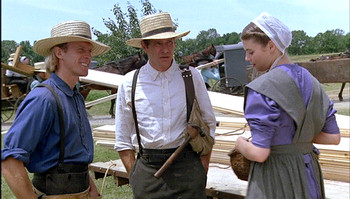
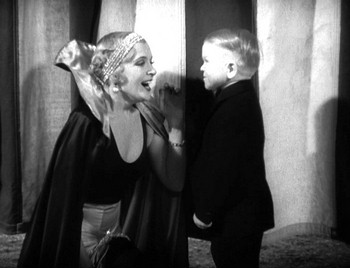
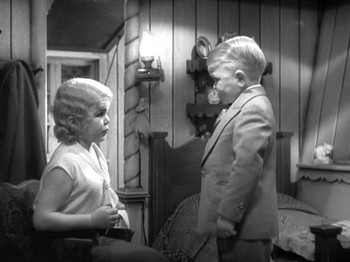
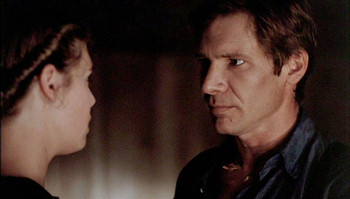
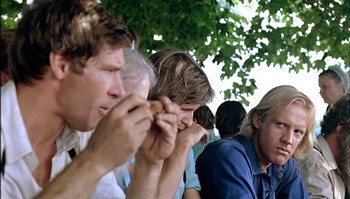
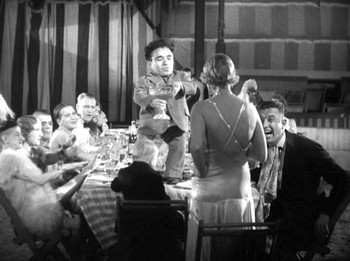
Of course, for every similarity there’s a difference. The Amish pride themselves of their plainness, while the “freaks” cannot fit in except among each other in their lack of normalcy. The community in Witness is tied to the land, while the circus performers are nomadic. The motives of the invaders are wildly different. And of course: no Harrison Ford Chicken Lady.
The pairing of Freaks and Witness was originally conceived in jest, but it stuck in my head. Both movies are initially distasteful in their use of the Other to attract an audience, but they redeem themselves with portrayals that are more nuanced and sensitive than expected. And I think they work well together – old and contemporary, black-and-white and color, grotesque and plain, decadent and modest, secular and spiritual.
And that’s the joy of the double bill, the new context into which one can put a movie, the classic compare-and-contrast essay prompt. It’s unnecessary for the movies to be mirrors of each other. Instead, they must merely have enough in common that they can have an intelligent conversation with each other, that they can talk about more than the weather.


Interesting comparison. Your comments regarding these two films remind me of a third, The Wicker Man, which would make a very interesting addition to make it a triple bill. I’m speaking, of course, of the original British film, not the Hollywood remake starring Nic Cage. In the original Wicker Man, we’re presented with a community of outsiders living a strange but noble life in an isolated place, and the entrance of a “normal” outsider into the community. The difference from the films you cite is that here the audience isn’t necessarily asked to identify with the outsider; in fact, I’d wager that most audiences find him priggish, conservatively moralizing, and a poor contrast to the sexual liberalism and (seemingly) peaceful philosophy of the islanders. The remake changes that dynamic and makes Cage’s character merely bland and undistinguished, whereas the islanders are turned into stereotypical horror movie villains who we feel no sympathy for. But the moral ambiguity and normal/outcast dynamic of the original make it a good film to play off these two.
Jeff- a very original take on the double-bill, I totally agree- both movies can talk about more than just the weather, that’s the beauty I find in double-bill, you can have two extremely bad films and still have a good time, its almost as if two negatives equal a positive.
Thanks for the contribution, it has been a pleasure reading the post.
Ed- I had the same feeling about the Wicker Man too while I was reading Jeff’s comparision, ofcourse my version refers to the Nicolas Cage film (which I thought was terrible).
Jeff- the 2nd edition of the double bill blogathon begins tomorrow- hope to have your contribution!